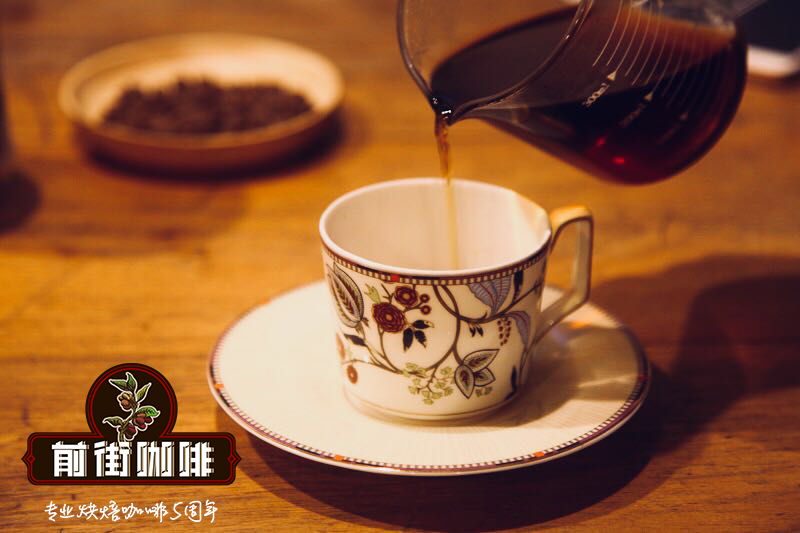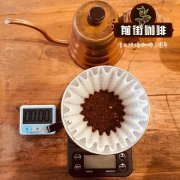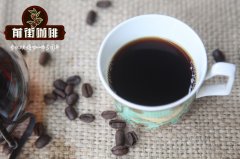How to make coffee by hand without flavor? how to adjust the brewing parameters

Professional coffee knowledge exchange more coffee bean information please follow the coffee workshop (Wechat official account cafe_style)
Drinking coffee is really just a way of life. When it comes to coffee, always be careful to say that you don't understand, even if you drink it, you just drink it casually. Whether this cautious attitude is modest or not, whether you know coffee or not is really not that important to most people.
IMG_1564
If you drink a certain type of coffee, or all the body to a certain type of beans, a certain practice, feel good, can continue to drink is enough. However, this is really just a casual drink, if you expect to make a good cup of coffee at home, then you need to involve a lot of theoretical knowledge.
IMG_1565
"temperature"
1. Extraction rate: the extraction rate of coffee is higher than that of temperature. Bitter and astringent coke is the flavor of the later stage, if the coffee is bitter, scorched, astringent, etc., the extraction water temperature can be reduced and adjusted. On the other hand, if you rush out and feel the smell of fresh water, there are still many flavors left in the coffee grounds, so you can consider raising the temperature. The specific extraction rate is related to water temperature, steaming time, extraction time, grinding thickness, even different grinding, different shape of particles after grinding and other variables. Water temperature is only one of the variables, which needs to be considered dialectically.
IMG_1566
two。 Powder layer steaming: under the premise of fresh beans, one of the noteworthy aspects of hand-brewed coffee is the development of steamed powder layer. In terms of temperature dimension, the higher the temperature is, the faster the coffee powder expands and develops when water is injected into the powder. In the case of shallow baked beans, fine grinding and the powder layer is not easy to expand, it can be considered to increase the water temperature to assist the powder layer development, but to grasp the degree, based on the principle of extraction.
IMG_1567
3. There are no fixed rules for this variable that can be adjusted, especially the hand flushing needs to be adjusted according to one's own preferences, generally, the water temperature is high and bitter, and low sour. It usually can be adjusted in the range of 80-92 degrees, depending on the baking degree of beans and which flavor characteristics of a certain bean you want to stimulate. It is suggested that the water temperature of beans with deeper baking degree is 80-85 lower. The water temperature of lighter baking is higher, 88-92 is usually moderate or unfamiliar with beans, it is recommended that 85-88 try this first, but also with grinding, steaming, to make specific adjustments.
IMG_1568
4. Before beginners are proficient in hand-brewed coffee, or some unfamiliar beans, we usually recommend that the water temperature in the hand-brewing pot is around 85-88, so that the brewed coffee can show the flavor of the coffee, and it will help to improve proficiency. Usually, it is not easy for beginners to master the size of the water column and the evenness of the circle. Do not be too persistent to stimulate some specific flavor of a certain bean, as long as you can not rush out the smell of scorched and fishy grass, it is enough to be able to flush out the flavor that coffee should have.
IMG_1569
"Grinding thickness"
1. Extraction rate: the extraction rate of coffee is also affected by the size of grinding powder. The extraction rate of fine powder is higher than that of coarse powder. Hand-brewed coffee is constantly filtered with water, not as good as siphon-like soaking. Therefore, the thickness of the powder is more important to the flow rate and the development of the powder layer. Here we only consider the thickness, do not consider the impact of higher-level, different brands of grinding on the shape of grinding particles, this is the place to burn money, bean grinders from 100 to tens of thousands of yuan each, Aiwo fragrance coffee this article "the basis of coffee-the choice of hand-made bean grinder, how to choose the right bean grinder" has an introduction to the bean grinder. Friends in need can come and have a look at it. I don't introduce too much here, but I have introduced a lot in other articles before.
IMG_1570
Ordinary enthusiasts here have a little skill, if it is an entry-level mill, then the use of powder sieve, can also achieve more than 1000 bean mill grinding effect. To put it simply, coffee powder needs to have appropriate fine powder, which can improve the hierarchical sense of the product, but when there are too many fine powder, it will become a source of miscellaneous flavor, so expensive grinding, such as more than 10,000, the grinding particles are very uniform, very few fine powder, the taste is really much cleaner, but I feel that the layered feeling is almost almost. So I usually advise my friends to choose a bean grinder according to their capacity, and using a powder sieve is a good compromise.
IMG_1571
two。 Powder layer development: usually fresh coffee beans will be better ground in the medium thickness powder layer (of course, this will change depending on the baking degree, the filtration equipment used in the extraction, etc.). The coarser the grinding is because the water passes through the powder layer very quickly, and the development of the powder layer becomes slower and finer because the water is not easy to block the water passage and develops slowly above the powder layer. Therefore, the coarse grinding water column and water injection speed can be slowed down to adjust the flow rate, while the relative fine grinding can dig a small hole in the powder layer to improve water penetration. Here is the principle of hand flushing and water control. It also needs dialectical consideration. In fact, extraction is a relationship that requires overall dialectical consideration. To find out these basic logical dialectical relations, it is not difficult to make a good cup of coffee.
IMG_1572
"the ratio of coffee to water"
1. Concentration: increase the amount of powder, or reduce the amount of water injection to adjust, there is an article about coffee extraction rate: "suitable for hand siphon and other boutique coffee extraction gold cup extraction" specifically introduces the reasonable extraction rate. It is usually adjusted in the range of 1:10-22, and the common ratio is roughly between 1:12 and 18. Just do it according to your favorite taste.
IMG_1573
two。 Content: the concentration of hand-brewed coffee varies depending on the flow rate and the time for the water to stay in the coffee powder layer. As the amount of Chongduo cup powder is more and thicker, the longer the water stays in the powder layer, the higher the extraction efficiency is. Relative to the amount of powder, the flow rate of the same boiling water column will cause a slower flow rate. Therefore, cooking a single cup needs to appropriately increase the amount of powder, small water column, multiple cups can appropriately reduce the amount of powder, increase the water column. This is why it is usually recommended: for example, 15 grams of powder per person, plus 10 grams per person. Specific needs to be considered according to different filter cup material size and other aspects, this is the basic principle, not a fixed water-powder ratio must be correct and reasonable, so it is not fixed, to dialectical point of view. If you understand the principle, you will know which way to make adjustments.
IMG_1574
"baking degree"
1. Shallow baking: shallow baked beans usually expand and bubble after meeting hot water, this is not not fresh, but the texture of shallow baked beans is relatively compact, and the beans that dare to bake shallowly are high-grade boutique beans, which are beans from high-altitude producing areas, and the texture will be much harder. Shallow baked beans after grinding contain less carbon dioxide gas, it is not easy to absorb water and expand, and it is easy to sink during cooking, resulting in sparse surface. This situation will affect the flow rate, so it is usually recommended that the shallow baked beans should have a high temperature of more than 90 ℃ and a smaller water column, so that it is easier to flush out the flavor. Once again, in fact, expansion bubbling has little effect on the flavor of coffee, in fact, it has a greater impact on the extraction process than on the flavor, so there is no need to worry too much about the size of bubbling.
IMG_1575
two。 Deep baking: deep-baked beans are relatively loose in texture, have good water absorption, the powder layer is easy to expand and bubble by water, and coffee powder is easy to float on the surface, but the more bitter and astringent coke and other miscellaneous flavors will be relatively heavy. Most of the high-quality beans are in medium light to medium deep, and most of them are roasted moderately. It won't even appear in the middle and deep. Because the heavy baking (long baking time and high temperature), the more obvious the bitter taste, and the more obvious the bitter taste, the less the flavor (other than bitter), because the bitter taste will outweigh those special flavors, that is, the flavor characteristics of fine beans. Flower aroma, fruit acid, nuts, chocolate, cream … The taste, etc., will become heavier (bitter) with the baking, but less. Only some beans of poor quality will do deep and heavy baking, using bitterness to cover up the mixed taste of poor beans.
IMG_1576
3. Therefore, the suggestions of baking degree and temperature are as follows:
Shallow baking: the temperature is about 90-92 degrees. After boiling, pour it into a copper pot and brew it. Of course, it is best to have a thermometer.
Moderate baking: the temperature is about 85-90 degrees
Partial depth baking: the temperature is about 80 ~ 85 degrees.
This is only a suggested direction adjustment, not a fixed temperature range.
"stew"
Here will be related to hand flushing manipulation factors, different methods of stewing slightly different, but the gold cup extraction principle is the same. Stewing is to do thoroughly, so that the right amount of water complete wetting powder, so as to form a good water channel to facilitate the following extraction process. Aiwo fragrance coffee "Coffee basis-the role of stewing in hand-brewed coffee" is described in detail, specifically about stewing, so I won't introduce it too much here.
Bald du gives some advice to friends who like coffee:
It's the same kind of bean, but many people can't get the same result. This is true even for many coffee practitioners, who usually understand the nature of coffee more deeply than we do and face it with more delicate emotions.
In most baristas in China, very few people can extract the same kind of coffee beans many times, so as to thoroughly pursue the flavor. Generally speaking, as long as the amount of coffee powder is consistent with other indicators and the extraction condition is good, the taste at this time is determined: it is the flavor of the coffee bean.
IMG_1579
So let me give you a little advice, don't jump to conclusions about beans used for the first time. Use different extraction techniques and adjust them over and over again. Don't care too much about the rules of the coffee, pay more attention to the state and taste of the coffee.
Once a foreign coffee teacher used very subtle adjustments to analyze the flavor outline of coffee, adjusted the grinding and extraction methods again and again, repeatedly confirmed the taste, and then sequentially looked for and constructed the best performance from the structure of the flavor profile. The final product takes into account the vision, flavor, touch, depth, aftertaste. I was moved by the shock it gave me at that time. Of course, this state may not be easy for senior baristas to reach. Let's share it with you.
IMG_1580
Some tips for asking and answering questions
1. The influence of altitude on water temperature
A: different elevations have an impact on the water temperature, so it is impossible to guess. A thermometer can also play a big role.
two。 Silver skin affects taste
A: different varieties and different treatments of raw coffee beans will retain part of the silver skin more or less. If you care about this, you can gently pat the powder cartridge after grinding, let the silver skin float with the wind and float away.
3. The effect of different grinder evenness and fine powder on taste
A: it does have an impact. As mentioned earlier, a better way to use a powder sieve is to get a mill with good grinding effect.
4. Effect of water quality on taste
A: the water quality varies from place to place. In some places, the water is salty. Installing a household filter is also very good for the health of household drinking water. The exquisite friend is a little sweet in Nongfu Spring.
5. Effect of Coffee temperature on Taste
A: coffee is generally recommended to drink while it is hot, especially espresso, whether it is Cabo or concentrated. Because Italian beans are deeply baked mixed beans. When it gets cold, all the smells come out, so drink it quickly. Individual beans are different, when the temperature is high, the acidity is not obvious, when the cup temperature drops to about 40 degrees, the acidity will be more obvious. A good single bean tastes good when it is cold, and it has another flavor, less miscellaneous flavor, clean taste and high-quality sweet and sour flowers, so it is expensive here.
Important Notice :
前街咖啡 FrontStreet Coffee has moved to new addredd:
FrontStreet Coffee Address: 315,Donghua East Road,GuangZhou
Tel:020 38364473
- Prev

Is the aroma of flowers and fruits of coffee beans determined by roasting? How to flush out the sweetness of coffee
Professional coffee knowledge exchange more coffee bean information Please follow the coffee workshop (Wechat official account cafe_style) when we get a boutique coffee bean, the outer package is always printed with a series of messages: producing area, manor, altitude, variety, roasting degree, flavor and so on. Every kind of information is a measure of coffee and beans.
- Next

Is the coffee made by hand sour or bitter? how does it taste better? should it be sour or bitter?
Professional coffee knowledge exchange more coffee bean information please follow the coffee workshop (Wechat official account cafe_style) 1. The grindability of hand-brewed coffee beans one of the secrets to brewing delicious coffee is the grindability of coffee powder. The degree of grinding of coffee powder is wrong, not to mention a delicious cup of coffee, it may not be extracted at all. Suppose that with the grinding degree of the mocha kettle, it is used to filter by hand.
Related
- Beginners will see the "Coffee pull flower" guide!
- What is the difference between ice blog purified milk and ordinary milk coffee?
- Why is the Philippines the largest producer of crops in Liberia?
- For coffee extraction, should the fine powder be retained?
- How does extracted espresso fill pressed powder? How much strength does it take to press the powder?
- How to make jasmine cold extract coffee? Is the jasmine + latte good?
- Will this little toy really make the coffee taste better? How does Lily Drip affect coffee extraction?
- Will the action of slapping the filter cup also affect coffee extraction?
- What's the difference between powder-to-water ratio and powder-to-liquid ratio?
- What is the Ethiopian local species? What does it have to do with Heirloom native species?

